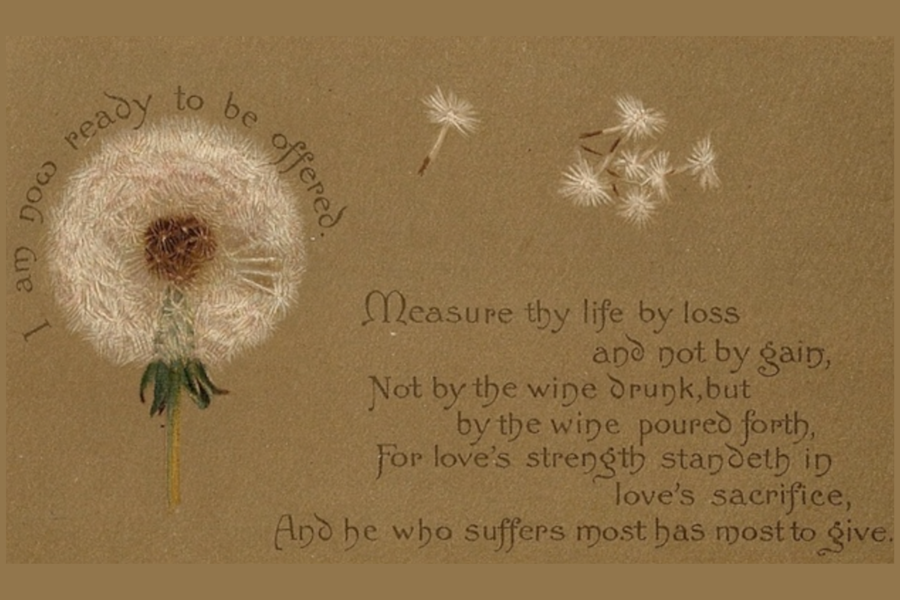This dandelion has long ago surrendered its golden petals, and has reached its crowning stage of dying — the delicate seed — globe must break up now — it gives and gives till it has nothing left.
What a revolution would come over the world — the world of starving bodies at home— the world of starving souls abroad, if something like this were the standard of giving; if God’s people ventured on “making themselves poor” as Jesus did, for the sake of the need around; if the “I” — “me” — “mine” were practically delivered up, no longer to be recognised when they clash with those needs.
The hour of this new dying is clearly defined to the dandelion globe: it is marked by detachment. There is no sense of wrenching: it stands ready, holding up its little life, not knowing when or where or how the wind that bloweth where it listeth may carry it away. It holds itself no longer for its own keeping, only as something to be given: a breath does the rest, turning the “readiness to will” into the “performance.” (2 Cor. 8:11.) And to a soul that through “deaths oft” has been brought to this point, even acts that look as if they must involve an effort, become something natural, spontaneous, full of a “heavenly involuntariness,” so simply are they the outcome of the indwelling love of Christ.
Shall we not ask God to convict us, as to where lies the hindrance to this self-emptying? It is not alone mere selfishness, in its ordinary sense, that prevents it; long after this has been cleansed away by the Precious Blood there may remain, unrecognised, the self-life in more subtle forms. It may co-exist with much that looks like sacrifice; there may be much of usefulness and of outward self-denial, and yet below the surface may remain a clinging to our own judgment, a confidence in our own resources, an unconscious taking of our own way, even in God’s service. And these things hold down, hold in our souls, and frustrate the Spirit in His working. The latent self-life needs to be brought down into the place of death before His breath can carry us hither and thither as the wind wafts the seeds. Are we ready for this last surrender?
Do you ask “Does God really mean the emptying to reach so far as this?” Study the inner life of Jesus. “I speak not of Myself” He says. “I can of Mine own self do nothing.” “I seek not Mine own will, but the will of Him that sent Me.” His human self-life, sinless though it was, was laid down that He might live by the Father, and our self-life, defiled and worthless, shall we not lay it down that we may live by Him?
But how? Again not by struggling and wrestling, but by dying to it in Jesus. “I am crucified with Christ” — I myself in the very essence of my being, I let myself go to that death, and by the mysterious power with which God meets faith, I find that He has made it true: the bonds are loosed and He can have His way with me.

See in these wild iris-pods how the last tiny threads must be broken, and with that loosing, all that they have is free for God’s use in His world around. All reluctance, all calculating, all holding in is gone; the husks are opened wide, the seeds can shed themselves unhindered. Again and again has a breaking come: the seed broke to let go the shoot — the leaf-bud broke to let go the leaf, and the flower-bud to let go the flower — but all to no practical avail, if there is a holding back now. “Love is the fulfilling of the law,” and sacrifice is the very life-breath of love. May God shew us every withholding thread of self that needs breaking still, and may His own touch shrivel it into death.

See how this bit of oat-grass is emptying itself out. Look at the wide-openness with which the seed-sheaths loose all that they have to yield, and then the patient content with which they fold their hands — the content of finished work. “She hath done what she could.” Oh, the depth of rest that falls on the soul when the voice of the Beloved speaks those words! Will they be said to us?
The seed-vessel hopes for nothing again: it seeks only the chance of shedding itself: its purpose is fulfilled when the wind shakes forth the last seed, and the flower-stalk is beaten low by the autumn storms. It not only spends, but is “spent out” (R. V.) at last. It is through Christ’s poverty that we are rich— “as poor” in their turn “yet making many rich” is the mark of those who follow His steps.
Are we following His steps; are we? How the dark places of the earth are crying out for all the powers of giving and living and loving that are locked up in hearts at home! How the waste places are pleading dumbly for the treasure that lies there in abundance, stored as it were in the seed-vessels of God’s garden that have not been broken, not emptied for His world, not freed for His use.
Shall we not free it all gladly? — it is not grudgingly or of necessity that the little caskets break up and scatter the seed, but with the cheerful giving that God loves. Have you ever noticed how often the emptied calyx grows into a diadem, and they stand crowned for their ministry as if they gloried in their power to give as the time draws near?…
Oh, that we may learn to die to all that is of self with this royal joyfulness that swallows up death in victory in God’s world around! He can make every step of the path full of the triumph of gladness that glows in the golden leaves. Glory be to His Name!
Text and images taken from Parables of the Cross by Lilias Trotter. The Project Gutenberg EBook of Parables of the Cross. Also available as a beautiful facsimile edition through the Lilias Trotter Legacy.
· Last Featured on Renovare.org February 2023


